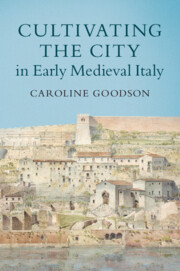Book contents
- Cultivating the City in Early Medieval Italy
- Cultivating the City in Early Medieval Italy
- Copyright page
- Dedication
- Contents
- Figures and Tables
- Acknowledgements
- Terms and Measurements
- Abbreviations
- Additional material
- 1 Urban Gardens and Gardeners
- 2 Patterns and Changes
- 3 The Shape of the Phenomenon
- 4 Alliances and Exchanges
- 5 Values and Ideals
- 6 Conspicuous Cultivation
- 7 Conclusions
- Bibliography
- Index
5 - Values and Ideals
Published online by Cambridge University Press: 08 March 2021
- Cultivating the City in Early Medieval Italy
- Cultivating the City in Early Medieval Italy
- Copyright page
- Dedication
- Contents
- Figures and Tables
- Acknowledgements
- Terms and Measurements
- Abbreviations
- Additional material
- 1 Urban Gardens and Gardeners
- 2 Patterns and Changes
- 3 The Shape of the Phenomenon
- 4 Alliances and Exchanges
- 5 Values and Ideals
- 6 Conspicuous Cultivation
- 7 Conclusions
- Bibliography
- Index
Summary
New cultural attitudes towards horticulture and gardening emerged in the early Middle Ages, and these structured the new economies and ways of life. From antiquity, land management was nested in several different clusters of ideas and values: ancient Roman cultural esteem placed upon effective estate management; emerging ideas about self-sufficiency of religious households, such as monasteries; and ideas about health and medicine. Some of these ideas were rooted in different genres of literature from antiquity, from agronomic treatises to medical theory, some of which were continued into the early Middle Ages. New, early medieval writings about monastic communities, about places where gardens grew, and about the use of plant material for medicines emerged. Each of these genres of writing is considered here for the light they shed on agricultural practices and consumption of urban produce. This chapter also considers the movement of cultivated urban spaces into ecclesiastical hands and explores how new cultural values attached to food provisioning for certain groups, such as the dedicated religious, informed habits of charitable or pro anima donations of cultivated land.
Keywords
- Type
- Chapter
- Information
- Cultivating the City in Early Medieval Italy , pp. 156 - 189Publisher: Cambridge University PressPrint publication year: 2021

